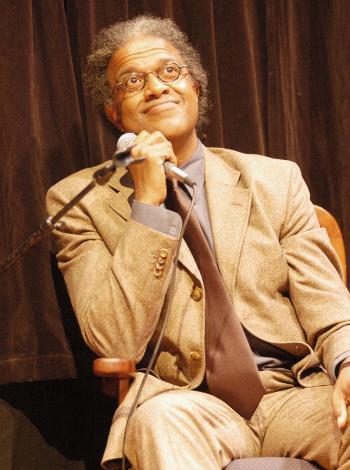For a writer who made his mark criticizing films with a mixture of dry wit, far-far-out metaphors and opinions that sometimes seem designed to surprise and provoke, Elvis Mitchell is startlingly polite. While taking his film class last year, I visited his office hours in the Carpenter Center’s Sert Café. Interrupting our conversation about comic books, he jumped up, crossed the room and opened the door for a shopping-bag-laden stranger.
This is the guy who, as a film critic for The New York Times, compared Dirty Dancing: Havana Nights to “[A]n episode of ‘American Dreams’ written by Pepe Le Pew.” In a glowing review of Jennifer Garner’s 13 Going on 30 he said that the film “is content to eat its retro snack cake and have it, too.”
In person, Mitchell is neither as surreal nor as opaque as his metaphors. He started our interview by asking me how I was doing, what kinds of classes I was taking and what I wanted to do with my life after I graduated. When not behind a keyboard or podium, he seems to spend more time asking undergraduates to discuss their film opinions than he does talking about his own.
After leaving the Times last spring in a much-discussed shakeup, he has returned to teach his popular film course, Visual and Environmental Studies 173x, “American Film Criticism” this semester. The class offered open enrollment last year to accommodate 107 students. Based on what TFs say was overwhelmingly positive student feedback, it has swelled even further this semester. Also returning is Mitchell’s seminar, African and African American Studies 183, “The African-American Experience in Film: 1930-1970.”
EVERYONE’S A CRITIC...
When I asked Elvis why people seem so interested in him, he chuckled, but feigned total confusion.
“I don’t know,” he said, grinning and shaking his head. “What do you think?”
I was caught off-guard. I suggested it had to do with his writing style, which had pushed the Times’ boundaries and sharply separated him from his peers, A.O. Scott and Stephen Holden.
He just shrugged.
This relaxed attitude toward his inherent different-ness may have been responsible for making Mitchell a point of discussion on campus, as well as in the larger worlds of the media and movie industries.
For starters, there’s his well-tended image. He dresses impeccably, and is rarely seen on campus in the same outfit more than once. He frequently wears designer shoes and natty three-piece tweed suits, and his well-tended dreadlocks are one of his trademarks.
“I’m a shopaholic,” Mitchell says when I asked how much he spends on clothes. “If you’re a critic of a visual medium, you should pay attention to how you look.” Still, he acts bewildered—though not entirely unhappy—about all this publicity.
“There are so many rumors about me that I kind of feel like [Tom Sawyer] sometimes, like I’m at my own funeral,” he says.
To use a Mitchell-ian analogy, he attracts gossip like Burberry-patterned flypaper attracts wasps.
Internet blogs have generated plenty of rumors about Mitchell’s personal life. Much of that comes, he conjectures, from the cachet of the Times.
Read more in Arts
Why Do I Keep Super Sizing Me?













